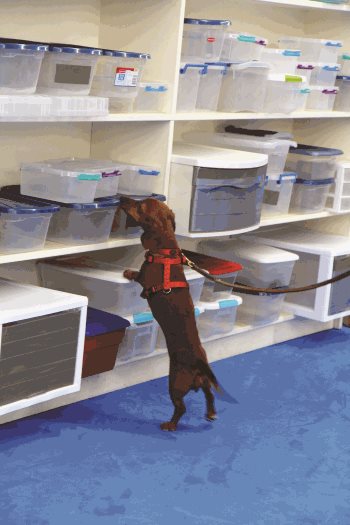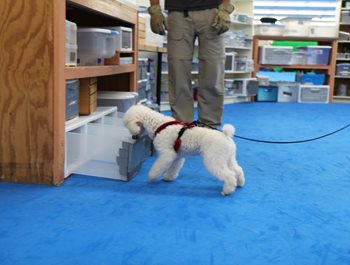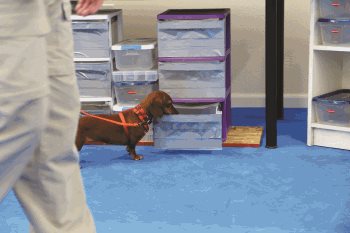
It is often said that the dog’s sense of smell is a thousand times stronger than ours — a dog has more than 220 million olfactory receptors in its nose, while we have only 5 million. So while our nose can detect a scent we might recognize as “pizza,” a dog’s more sensitive nose will be able to distinguish each ingredient on that pizza. It comes as no surprise then that the sport of scent detection, which combines the dog’s ability to detect scents and follow them to the source, is growing by leaps and bounds.
The power of the dog’s nose is harnessed by humans in many ways and greatly benefits our society. Breeds such as German Shepherd Dogs and Dobermann Pinschers are employed widely by law enforcement to track criminals, detect explosives, and alert to the presence of illegal substances. Bloodhounds are famous for finding missing persons, even when their trail is weeks old and are now working with park rangers in sub-Saharan Africa to track down poachers, and adorable but focused Beagles can be seen at airports, making their way through baggage claim areas. Based on this serious work performed by these talented dogs around the world, scent detection is the recreational version, which welcomes all dogs and celebrates their natural skill.
Many dog sports require a fair amount of guidance from the handler, however, scent detection work relies heavily on the dog’s inborn abilities. The handler must trust their dog’s nose to detect a particular scent, which the dog has been trained to recognize, and then follow the trail of that scent – always on a leash, unless instructed otherwise by the judge -- to the origin. The scents, which are utilized in CKC Scent Detection trials are wintergreen, pine, anise, birch, clove, and cyprus; one drop of scented oil is placed on a cotton swab and then hidden out of sight. It is up to the dog to find the scent within a specified search area and ultimately to communicate to the handler that the source has been found.

At the heart of scent detection, is the dog’s ability to learn how to distinguish particular odours and follow that scent to the source. A good way to start your dog on this journey is to play “hide and seek” games with a favourite food item or toy, encouraging your companion to search for one of these items somewhere in your house or garden, and reward them when they find it. Once your dog has the routine down, you can begin acclimatizing him or her to the scents used in the sport of scent detection. There are CKC-sanctioned clubs across the country, so be sure to contact your local club and inquire about the possibility of classes or workshops meant to assist those interested in training for scent detection.
The sport is open to all dogs, with height division - small, medium, or large. There are five classes, starting with the entry-level “instinct” class, and in ascending order the novice, open,
excellent, and master classes. Each class tests the dog’s ability at a new, more challenging level, encouraging greater perseverance and focus on fine-tuning of olfactory senses. The source may be within a container - the only option for the instinct level - interior of a building, or exterior - the great outdoors!

It goes without saying that all dogs must be leashed and under control at all times, and extensive socialization from puppyhood will ensure a confident contender.
All CKC accredited clubs may apply to hold scent detection trials, and although the start date for official trials is not until next year, sanction matches may be held from October 1, 2018. In response to the overwhelming interest that has been shown in this exciting and fun sport, the Canadian Kennel Club will be holding a contest applicable to the first 20 clubs that apply to hold a sanction match. Stay tuned on the CKC website for details!